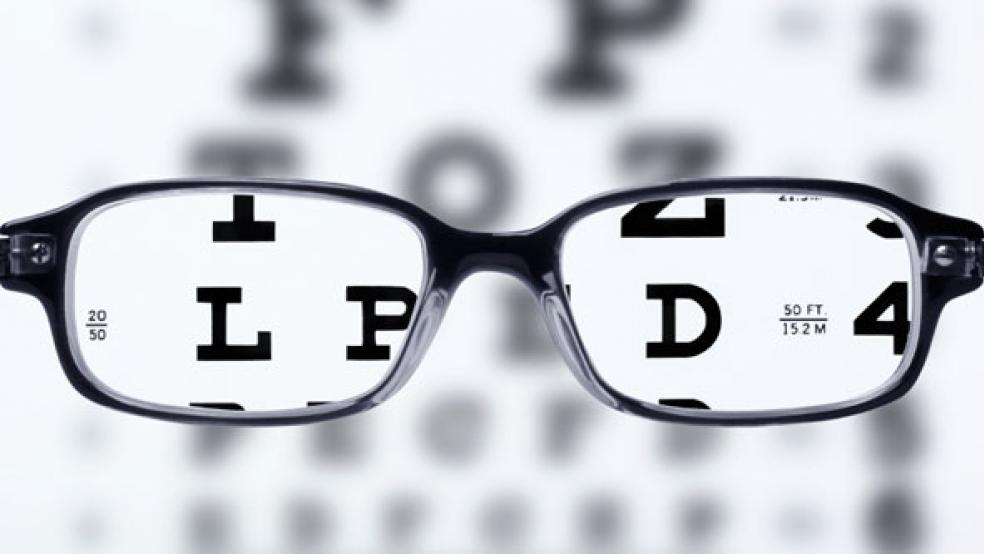Eyewear retailer Warby Parker burst onto the scene in 2010, offering nerdy-chic prescription glasses over the Internet for an all-inclusive $95. Since then, the company has become a media darling. “Warby Parker completely disrupted the designer eyewear industry when it launched two years ago,” gushed a Business Insider article early this year, making a fairly typical claim. It’s a bold statement, but is it true – is David really putting Goliath on its toes?
To be sure, Warby Parker’s growth in its first two years is enviable. It hit its first-year sales target three weeks after it launched. In 2011, it hit sales of about $10 million, and it recently brought in a $37 million round of funding. And the amount by which it undercuts its competitors – selling what has typically cost consumers $300 or $400, in a seemingly honest way – is enough to give any competitor pause. “We recognize that we’re getting a lot of attention from people within the industry,” says Neil Blumenthal, co-founder and co-CEO of Warby Parker. “I think this will happen whenever a company does something disruptive and different.” And there’s that word, disruptive, again.
At the least, the spotlight pointed at Warby Parker has also shed light on the corporation that has for the past couple of decades increasingly monopolized the eyewear industry: Luxottica (NYSE: LUX). Few eyeglass wearers were previously aware that the company owns the Ray-Ban, Oakley and Oliver Peoples brands, among others. In addition, Luxottica creates the eyewear for a host of other brands, paying a licensing fee to put names like Chanel, Stella McCartney, Anne Klein, Brooks Brothers, Ralph Lauren, DKNY and others on its glasses.
Luxottica also owns many of the retail stores where customers pick out their frames, including LensCrafters, Pearle Vision and Sunglass Hut, and it has the license to run both Target Optical and Sears Optical. As of 2011, Luxottica ran over 7,000 retail outlets around the world. In other words, the company controls every step of the supply chain, and delivers markups to itself at every step in the process.
Warby Parker’s executives say their goal isn't to become the next Luxottica, but rather to build a sustainably profitable company that pressures Luxottica to bring down its inflated prices. At the same time, the upstart is opening brick and mortar locations and expanding internationally, both of which suggest it is aiming to become a major competitor to the established giant.
So far, though, the buzz building over upstart Warby Parker hasn’t outwardly impacted Luxottica’s model. (The company did not respond to interview requests for this article.) Small local retailers, on the other hand, are taking note, in many instances even engaging in the sincerest form of flattery.
Jenny Ma, owner of two Luxeye Optical stores in New York’s Williamsburg neighborhood, recognizes the forces at work behind Warby Parker’s success. “I think it’s a good pressure … It forces business owners to be courageous about winning customers over.” For Ma, that means trying to beat Warby Parker at its own game. She recently began offering a selection of glasses “comparable in style to Warby Parker” for the same price – $95 including lenses – with the added bonus, she said, of in-person service.
And in the online realm, copycats have been popping up as well. In June of last year, the discount online retailer Bluefly launched Eyefly, which offers the same deal as Warby Parker, but for $99. Blumenthal says Warby Parker has counted at least 10 such copycat sites in the United States alone.
Of course, Warby Parker’s revenues so far are barely a drop in the bucket compared to Luxottica, which brought in over $6.2 billion in its most recent fiscal year. But at the very least, Warby Parker has pulled back the curtain on an industry with markups that are hard to justify. And that, in addition to starting a profitable, socially conscious company, was the goal. “We started Warby Parker … to radically transform the eyewear industry, which we thought was massively overcharging customers,” says Blumenthal.
That it has gained traction so quickly suggests that the industry at large may have to start paying attention sooner rather than later. “If there were more options for inexpensive eyewear, maybe Warby Parker wouldn’t be so popular,” says Ma.


